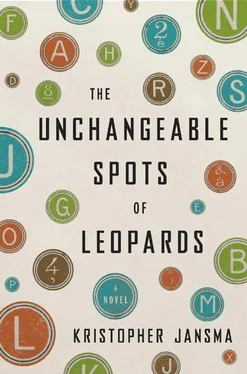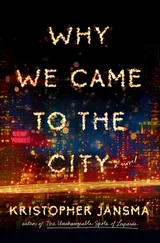She continues to scour the walls of Terminal B — she thinks, What sort of backwoods airport has no goddamn clocks? There had been ten of them, all in a shiny row, back in the far-nicer Terminal A. You’ll be back in true civilization soon, she reminds herself. But then a second thought hits her. By lunchtime you’ll be sitting in Haslett’s office, trying to explain how you — the only one who had been out to the damned Oakes Mines & Estate before — got scooped for the literary find of the decade. She dreams about rolling herself a perfect little cigarette, but she does not want to go back outside and risk missing her flight. People are already piling up at the gate, though the attendants are not letting anyone board yet. She thinks she might have a tall glass of gin instead, with parasite-free ice cubes in it. It’s early, sure, but she is still on Africa time.
She stops in her tracks and reaches for the side pocket of her purse. From inside it she removes a watch. It is bright gold and quite elegant — but far too big for her wrist. It belonged to the man who broke her heart. She’d found it deep in the pocket of his jacket, which had been auctioned at the estate sale; she’d gotten it for practically nothing. She checks the watch and sees that she has at least twenty minutes before her flight should leave. Just then, a modest sign halfway across the terminal catches her eye. TEN-MINUTE TIMEPIECE REPAIR. Ten minutes to get the watch taken in, she thinks, ten minutes to get my drink. Wristwatch in hand, she moves swiftly toward the kiosk — closer and closer. She startles a slim man behind the counter. He sits on a high chair, reading a newspaper.
“I’ll need some links removed from this, please,” she says.
The static comes on again. “… flight two thirty-seven to New York… now begin boarding.”
The slim man sets the newspaper down and, with a genial smile, turns the watch twice in his hands. “They sure don’t make them like this anymore.”
She does not particularly care. She is staring across the way, at the disorganized line of passengers beginning to move, then over at a turquoise blue gin bottle, which glints behind the bar at W. W. Gould’s. If she would just look ten degrees further to her left she would see him, lifting the pages up by their edges and hefting them lightly in his fingertips as if, by weight alone, he can estimate their value. Like so many a long-gone prospector he is worried that what remains after his patient sifting may not be enough. But its millesimal fineness cannot be weighed, only determined beneath a careful squint through an eyepiece. He thumbs through the pages. What percentage of its parts is pure?
She looks back at the watch man, holding the timepiece up close to his work lamp and studying it under his extendable magnifying glass for a moment.
“You from around here?” he asks.
“No,” she says. “I’m an editor in New York City.”
He gives the requisite impressed look. “Where’d you get this, anyway?”
She certainly does not feel like explaining the whole sordid story to an oddball watch repairman in the middle of a tiny, time-forgotten airport.
“Could we just hurry this along? I have a plane to catch.”
The man smiles and swiftly begins his work. She watches out of the corner of her eye as, to his credit, his delicate fingers wield the tools of his trade with precision. As the watch man works away she wonders that there are still people in this world who learn a skill from their fathers and then apply it, day in and day out. If Mr. Haslett fires her, she decides, she’ll go back to Chicago and make her father teach her how to be an electrician. Wouldn’t there be something satisfying in that? Tearing open walls and tracing lines of copper and plastic from switch to bulb? People need lights. People always need light. She could bring light to the world. Plus she thought it might be nice to be in a union. Gripe about taxes, worry over pensions — that sort of thing.
Then, suddenly — finally — the thumbing of pages stops. The uncapped pen falls from his paralyzed fingers and leaves a jagged squiggle on the title page. He has noticed her, at last. There, fifty yards away from him, is the woman he left in Africa many months ago. With the same luggage. Talking to the man at Ten-Minute Timepiece Repair — of all places to have stopped! — and they are examining his watch.
The sheer coincidental madness of it all sends a primeval panic up his spine and he lurches back, looking for some way to escape. But wait! he tells himself. No more running away. We’ve put that all behind us now. We’ve changed our spots, haven’t we? He doesn’t even know why he’s referring to himself in the plural — the “royal” we — he doesn’t know it is because he’s speaking to the pages now, too.
Just as the woman is about to apologize for having been so short with the watch man, she hears the rough vibrations of his chair being pushed backward against the linoleum. She squints toward the origin of the noise — the small round table beside W. W. Gould’s. Early morning sunlight blinds her, but through its golden shining she can just make out the man whom she has hated, and loved. A man whose real name she doesn’t even know. He looks once into her green eyes and then, with a smile so faint she nearly misses it, he glances down at the table. At the pages. Then, before she can even react, he rushes away. He has a slight limp, but he is quick as a jungle cat. As the man steps onto the escalators, he looks back over his shoulder — just for a moment, directly at her, and again at the pages — and then he is gone.
She twists and takes a quick step, as if she might rush after him, but then she remembers the watch. She remembers the gin. And her flight.
She tells herself that it is obviously just the jet lag, playing tricks. Must be his dopplegänger, she jokes to herself. Why would he leave all his papers behind like that?
“… all rows, all rows… flight two thirty-seven… ”
The slim repairman slips the watch onto her narrow, pale wrist. It fits perfectly and she smiles appreciatively. Then he hands her a small plastic bag containing the links that he’s removed. She fumbles in her purse to find dollars amid all the cedis she’d forgotten to exchange back in Terminal A. What on earth can I do with those now? she thinks. Then, as she turns to leave — as she begins to move toward the abandoned pages — the young man jabs his thin, pink fingertip at a small mark on the golden edge of the watch. “That’s our stamp right there.”
“You stamped it?” she asks, studying the near-microscopic insignia.
He shakes his head. “Was stamped already. You must have had work done on it here once before.”
“I sincerely doubt it,” she says, thinking, I have just ten minutes.
The man shrugs. “Bring it back anytime. If your wrist ever gets any bigger.”
“I’ll be sure to do that,” she says. Then, at last, she tugs her broken suitcase behind her over to the bar at W. W. Gould’s. She is so close now.
It takes only a minute to get the bartender’s attention, and another two for him to pour the drink. As she pays, she watches the line of passengers moving slowly through her gate. The watch feels heavy and good on her wrist. It says she has eight minutes left, so she sits down at the closest table and drains the glass in four long, slow gulps. She shuts her eyes and breathes out deeply. She thinks that now she will be able to sleep on the way back to the city, and that her impending execution in the Haslett & Grouse offices will not sting quite so badly. She thinks maybe she can run over to Emerson Books and find some sort of For Dummies Guide to Electrical Wiring. She’d at least like to have something to read—
Читать дальше











